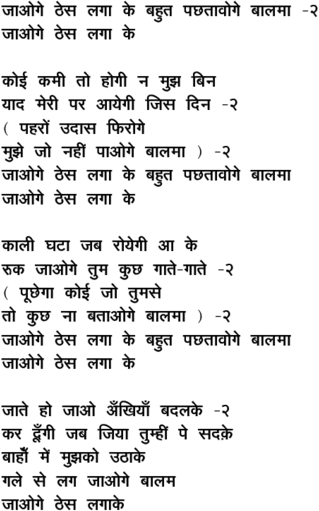Friends,
This is the third song in the series. In my view, this song very aptly epitomizes today's woman, particularly a strong woman of the new age. And what could be a better day than today - the "International Women's Day" - to publish this song?
Film : Fareb (1953)
The lead female role was performed by Shakuntala. I tried to check if it was Shakuntala Paranjapye or Baby Shakuntala, but unfortunately cannot confirm anything.
I wish if it would have been Shakuntala Paranjapye (mother of Sai Paranjapye), how befitting it would have been to have this song filmed on her; since she herself was one of the revolutionary women in India in those days because of her work in the family planning field since 1938.
Lyrics: (courtesy http://smriti.com/hindi-songs/)
This is the third song in the series. In my view, this song very aptly epitomizes today's woman, particularly a strong woman of the new age. And what could be a better day than today - the "International Women's Day" - to publish this song?
Song #3 : जाओगे ठेस लगाके, बहोत पछताओगे बालम…
Film : Fareb (1953)
Director : Shaheed Latif
Cast : Kishore Kumar, Shakuntala, Lalita Pawar, Zohra Sehgal, Tiwari, Amar
 |
| Anil Biswas and Lata Mangeshkar |
 |
| Courtesy: |
Lyrics:
Majrooh Sultanpuri
Composer:
Anil Biswas
Singer:
Lata Mangeshkar
USP of the song:
Fareb was one of the few films where Kishore Kumar was in a lead role. It comprised of excellent music composition by Anil Biswas and it carried 7 songs, all wonderful.
1) आ मोहब्बत की बस्ती बसाएँगे हम (लता-किशोर)
2) हुस्न भी है उदास उदास (किशोर)
3) मिला दिल मिल के टूटा जा रहा है (लता)
4) उदासियों में नज़र खो गयी चले आओ (संध्या मुख़र्जी)
5) मोरे मन में समा गये ऐसे पिया (लता)
6) मेरे सुख दुख का संसार तेरे दो नैनन में (किशोर)
1) आ मोहब्बत की बस्ती बसाएँगे हम (लता-किशोर)
2) हुस्न भी है उदास उदास (किशोर)
3) मिला दिल मिल के टूटा जा रहा है (लता)
4) उदासियों में नज़र खो गयी चले आओ (संध्या मुख़र्जी)
5) मोरे मन में समा गये ऐसे पिया (लता)
6) मेरे सुख दुख का संसार तेरे दो नैनन में (किशोर)
However this particular song जाओगे ठेस लगाके stands out from the rest, here is why:
If you look at most of the films from the Black & White era, you will find that all the female lead characters in the film were portrayed as extremely soft, sensitive, dependent, low in confidence, पतिव्रता, etc. and which was more or less true in those days since Indian community was mostly male dominated. You will remember dialogues like "मै तुम्हारे चरणों की दासी हूँ" or "तुम मर्द हो ना, इसीलिए हमेशा दिमाख से काम लेते हो, कभी कभी दिल से भी काम लिया करो".
And here comes the heroine of this film who drags herself out of the traditional image and virtually blasts off her beloved with words which were very strong compared to her peers in other films. This was rare and extremely brave considering the era in which the film was released. Just look at the words in the stranza - पहरो उदास फिरोगे मोहे जो नहीं पाओगे बालम or जाते हो तो जाओ अँखियाँ बदलके...
The lead female role was performed by Shakuntala. I tried to check if it was Shakuntala Paranjapye or Baby Shakuntala, but unfortunately cannot confirm anything.
I wish if it would have been Shakuntala Paranjapye (mother of Sai Paranjapye), how befitting it would have been to have this song filmed on her; since she herself was one of the revolutionary women in India in those days because of her work in the family planning field since 1938.
Hats off to late Majrooh ji for penning down one of the most brave songs in the history of Hindi film music. Composition by late Anil da has also matched the revolutionary mood of the female character. It was Anilda's pure genius that all 3 stranza have been composed differently. Lata ji, as usual, has been phenomenal in her rendering.
So, enjoy the song and the day!
Link to the song: जाओगे ठेस लगाके
Lyrics: (courtesy http://smriti.com/hindi-songs/)


खूप छान लेख, काळाचे, त्या काळातील स्त्रियांच्या स्थितीचे अचूक वर्णन, गाण्यातील स्त्रीच्या मनोगताचे उत्तम विवेचन. गाणे तर केवळ अप्रतिम
ReplyDeleteनवीन माहिती कळली ... खूप छान
ReplyDelete